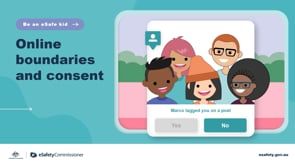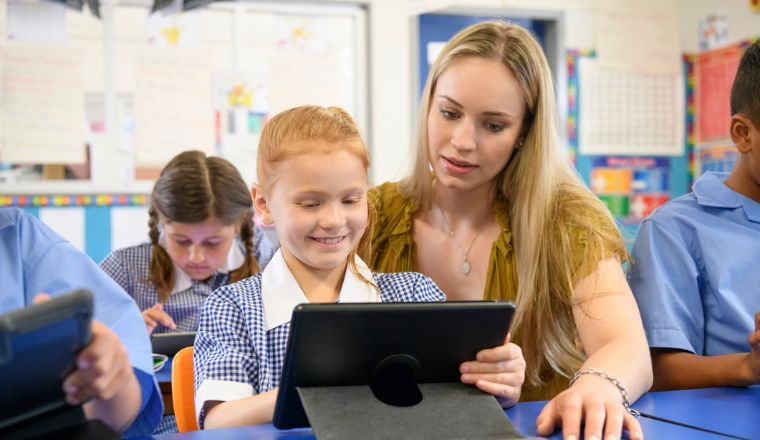NSW Department of Education professional learning
Generative Artificial Intelligence (AI) in education
The four short courses respond to the challenges and opportunities presented by the emergence of generative artificial intelligence (GenAI) into the education landscape:
- Gen AI Foundations – provides a base-level understanding of key elements and issues surrounding the emergence of a range of generative artificial intelligence (GenAI) technologies into the educational landscape.
- Data Privacy – provides an understanding of key elements relating to the obligation of NSW Public Education staff to protect the privacy of students and staff in relation to any use of generative AI (GenAI) tools.
- Academic Intergrity – provides an understanding of the impact of generative AI (GenAI) on academic integrity in the context of learning and assessment.
- Accountability and Monitoring – provides an understanding of accountability in the context of generative AI (GenAI).
Responding and reporting critical online incidents
This is a video-based professional learning from the Australian eSafety Commissioner.
The four videos use case studies and information about incident assessment tools to inform educators how to can manage and report cyberbullying, sharing of intimate images without consent, sharing of fight videos, viral challenges and behaviours that may lead to self-harm or suicide.
- improved self-efficacy in responding to online incidents
- improved consistency of practices to managing wellbeing issues with online incidents
- increased awareness of eSafety’s reporting functions
- awareness of eSafety professional learning and resources.
More professional learning
Cyber Security and Awareness - primary
Do your students question you about cyber security concepts and you don't how to respond?
Learn how you can guide them with this University of Adelaide's Massively Open Online Course (MOOC).
Cyber Security and Awareness - secondary
Students are increasingly curious about cyber security concepts such as protecting personal information, ethical hacking and how they can enter this field as a cyber professional.
Learn how you can guide them with this University of Adelaide's Massively Open Online Course (MOOC).
Guide to teaching Cyber security
What are the basics every educator and student should know? Read this article from Common Sense Education.
Teaching online safety in lower primary
Self-contained modules to help you teach safe, respectful and responsible online behaviours from the eSafety Commissioner.
Early years professional learning
eSafety has teamed up with Early Childhood Australia to create a series of online learning modules for early childhood educators.
Pre-service teachers - professional learning
The eSafety Commissioner provides free presentations to pre-service teachers to build skills in teaching online safety.
Videos and podcasts
What does a digital citizen of the future look like?
Watch the recording of a panel discussion with educators and leaders as they talk about:
Online safety education guidelines or frameworks
Solving challenging issues
Adaptive teaching strategies
Cyber security career education
Bringing parents and carers into the mix
Cyber ambassadors are safe online podcast
Listen to the podcast from our Cyber Ambassadors, the Department of Student Voices in Education and Schools (DOVES), where students from NSW public schools talk about the technologies they use, identify the benefits and challenges of being online and give us tips on how to keep cyber safe.
Transcript of Cyber ambassadors safe online podcast (95.11KB)
Gamify your learning with Makecode Arcade
Guide your students on using Microsoft’s Makecode Arcade to create a cyber maze. Students will learn:
how to code
core programming and game development concepts
use art and design to construct a cyber maze
research digital citizenship and cyber safety
File
Gamify your learnign with Makecode Arcade video transcript (PDF 185.93KB)Use Microsoft Edge and Teams to nurture cyber safe citizens
Watch the video to see how you can empower yourself and your school community with the use of Microsoft’s suite of software such as Edge and Teams and apps such as Microsoft Family to ensure cyber safety.
Use Minecraft Education to nurture cyber safe citizens
Watch the video to see how you can be empowered to improve your student’s digital maturity. Learn how to use Minecraft EE to build their online safety understanding and skills.
Video transcript (PDF 256.77KB) (PDF 256.77KB)
Slideshow (PDF 6.16MB) (PDF 6.16MB)
eSafety Commissioner's video library
Primary and high school teachers can access the eSafety Commissioner's video library to watch videos to support students with learning on several topics including:
screen time
respectful online behaviours
gaming safely online
digital resilience
Access the eSafety Commissioner's video library for educators

Online boundaries and consent
eSafety Commissioner's reports and articles
The risks and benefits of online gaming for children and young people - this 2023 report looks at the gaming experiences of 1,799 children and young people in Australia aged 8 to 17 years old who play video games online. It draws on the results of a mixed-methods study carried out by eSafety in August and September 2023.
The Mind the gap Aug-Sep 2021 report shows that digital parenting needs to evolve so that young people are well prepared to respond safely to dangers online.
Annual report 2021-22 - talks about how they are working with the education sector to make sure Safety by Design concepts are incorporated into school curriculums to help build the next generation of ethical engineers, data scientists and product designers.
Australians’ negative online experiences - this report discusses how more Australian adults are being exposed to online harms since the last national adult survey in 2019.
Evaluation of teacher learning program 2021 - eSafety’s professional learning webinars were highly valued by participants due to the quality of the program and the importance of the subject matter.
Digital lives of Aussie teens Feb 2021 report- read how teenagers deal with negative online experiences, the barriers they face, information they need to stay safe online and where they go to seek this. It also looks at the steps young people take to build positive relationships online.
Online safety for young people with a disability - people with disability experience a ‘digital divide,’ meaning they can miss features and benefits that other Australians access online. This report details how eSafety can help protect from serious online abuse.
Online safety for young people with intellectual disability Dec 2020- the internet can be a great equaliser for young people with an intellectual disability. It can break down barriers, enabling communication and socialisation with their peers, and help overcome isolation. This report examines the challenges and how to navigate potential online pitfalls.
How adults with intellectual disability experience online abuse May-Dec 2021- this report discusses how people with intellectual disabilities use the internet and how they experience and deal with online abuse.
Online experiences of Aboriginal and Torres Strait Islander children and their parents and caregivers Jul-Sep 2021 - this report discusses that while the internet provides a wealth of positive experiences, Aboriginal and Torres Strait Islander children and young people are more likely to be exposed to a range of online harms, including hate speech, discrimination, and bullying.
Other reports and news
The Educator Australia 17 June 2024- Social Media: Is it a Choice? Is it an Addiction? Is Anyone Responsible?- news article
The Educator Australia 30 May 2024- Social media makes youth feel bad about themselves – study
In Feb 2024, Microsoft asked Australian parents about their child’s experiences. Questions asked questions were about their perceptions of life online and experience of 10 different risks, across five broad risk categories. Access the Global online safety survey 2024 report.
Report of a high school student survey conducted by the Cyber Safety Project that shows:
- 83% access social media
- 74% play game online
- 53% have witnessed cyberbullying
- 38% faced negativity online.
Read Proofpoint’s 2023 State of the Phish report to learn how Australian organisations were most likely to experience both successful phishing (94% vs 84% global average) and supply chain attacks (80% vs 69% global).
More resources for educators
Virtual classrooms for primary and interactive challenges for high schools.
Get your students to prepare a submission for this exciting 2024 challenge.
